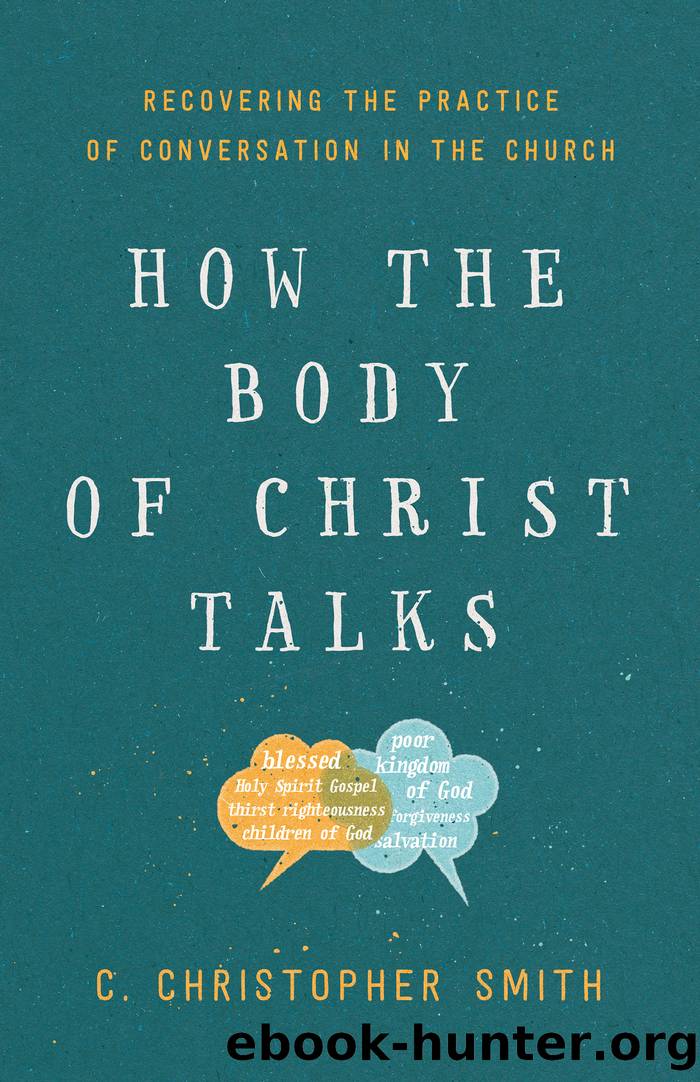How the Body of Christ Talks by C. Christopher Smith

Author:C. Christopher Smith
Language: eng
Format: epub
Tags: Church Life;Conversation—Religious aspects—Christianity;Dialogue;REL108000;REL012000;REL012120
ISBN: 9781493417056
Publisher: Baker Publishing Group
Published: 2019-03-08T00:00:00+00:00
The Messiness of Sin
Striving to live in the community of Godâs people is no less complicated today than it was in the days of ancient Israel or those of the first-century churches. Our calling to follow Jesus is a call to embody Christ with other human beings, and however much we might long for neatness and order, this calling will undoubtedly be messy. The messiness of living, talking, and working with other humans is above all a result of personal and social sin in the world. The fall of humanity in the garden of Eden not only alienated humankind from God but also alienated us from one another. One of the foremost effects of sin is that certain humans will attempt to dominate and rule over other humans (Gen. 3:16). Even in the first generation after the fall, Cain and Abel are alienated from each other as Cain becomes jealous of Abel, eventually killing him.
Jealousy is a powerful force that continues to alienate us today. We constantly compare ourselves to others and long for more resources, more stuff, and more power. This situation is made worse by our inclination to greedâthat is, our hesitancy to share our resources with others. If we have privilege and a wealth of resources, we are hesitant to share these assets with others who are not so privileged. Additionally, we are alienated from one another by our pride. We think we understand ourselves and others better than we actually do. Our pride inclines us to pigeonhole others into neat categoriesâDemocrat, Republican, gay, affluent, homeless, Lutheran, Southerner, and so onâand to engage with them on the basis of stereotypes rather than doing the slow and challenging work of getting to know them.
Our pride similarly skews our understanding of the social and natural worlds within which we are embedded, warping our ability to have meaningful conversations with others, especially those who come from different backgrounds than we do. To protect ourselves from the searing effects of pride and the desire for power, we often learn to respond with distrust. If we get a whiff that someone has an inflated sense of their own knowledge or agenda, we are inclined to take a step back and attempt to protect ourselves with the tools of distrust, including skepticism and dismissiveness. As necessary as these measures might seem at the time, they serve only to widen the existing gaps between us.
Our Sunday night conversations at Englewood Christian Church were extremely volatile in their earliest years. Members yelled at and were fiercely sarcastic with one another. This volatility was fueled in large part by pride and a desire for the sort of power that came from controlling the direction of the conversation (and presumably the direction of the church as well). Many of us were proudly adamant that our convictions were right, and we defended them fiercely, even at times with sarcasm. Itâs not difficult to imagine why we had such difficulty talking with one another in those early years!
To say
Download
This site does not store any files on its server. We only index and link to content provided by other sites. Please contact the content providers to delete copyright contents if any and email us, we'll remove relevant links or contents immediately.
Joan of Arc by Mary Gordon(4076)
Victory over the Darkness by Neil T. Anderson(2846)
The Gnostic Gospels by Pagels Elaine(2514)
Devil, The by Almond Philip C(2317)
The Nativity by Geza Vermes(2217)
The Psychedelic Gospels: The Secret History of Hallucinogens in Christianity by Jerry B. Brown(2145)
Going Clear: Scientology, Hollywood, and the Prison of Belief by Lawrence Wright(1970)
Going Clear by Lawrence Wright(1952)
A TIME TO KEEP SILENCE by Patrick Leigh Fermor(1888)
Barking to the Choir by Gregory Boyle(1811)
Old Testament History by John H. Sailhamer(1795)
Augustine: Conversions to Confessions by Robin Lane Fox(1762)
A History of the Franks by Gregory of Tours(1709)
A Prophet with Honor by William C. Martin(1708)
The Bible Doesn't Say That by Dr. Joel M. Hoffman(1673)
The Knights Templar by Sean Martin(1645)
by Christianity & Islam(1622)
The Source by James A. Michener(1589)
The Amish by Steven M. Nolt(1553)
